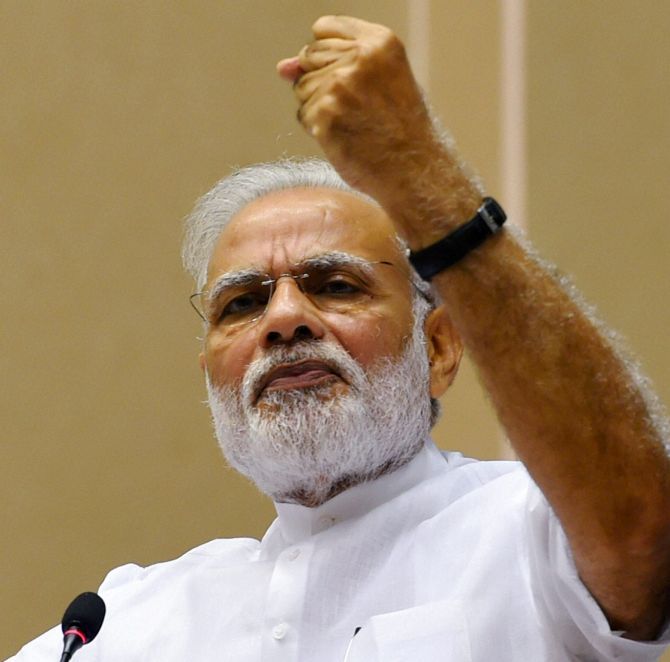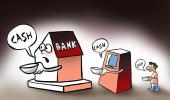'I have no doubt that the government means well.'
'I am merely curious to know whether my suspicions of it being enthusiastic about shooting first and aiming later are unfounded,' says Aakar Patel.

It was said about the French leader Giscard D'Estaing that the idea of a European Union thrilled him, but the details bored him. I have often suspected that this attitude is to be found in many of the things that are taken up by this government.
Over two weeks have gone by since Narendra Modi's grand strike against black money and it is fair to say that two things need to be acknowledged.
First that the wide popular support for Modi is holding despite inconvenience.
Second that the evidence of an economic problem caused by the shortage of cash is piling up through reports.
The reports are similar, whether from Surat or Ludhiana or Moradabad, all manufacturing centres. They speak of units either running under-capacity or shutting down because of lack of demand, and of raw materials being unavailable because of cash shortage.
Another common factor is the reluctance of the units to keep labour, and migrant workers being laid off or told to return home for now.
We will have to wait for proper data to come in but if the anecdotal reports are indicators of something larger going on there is trouble ahead in December and the new year.
What explains the support for Modi which, and this cannot be denied, is wide and popular despite the uncertainty deliberately produced? Let us look at it since this period has also brought the Modi government to mid point.
The unique thing about Modi's time in office so far is his launching of magnificent schemes and major announcements.
These launches and announcements capture the imagination of the country, certainly they capture the attention of the media.
Make in India, bullet train, Smart Cities, Swachch Bharat, surgical strike, demonetisation. All of these and other initiatives of Modi share a pattern. They represent a grand break from the past. They promise to rip away the old and decayed and replace it with something new and better.
Do they achieve this to any extent? What are the real consequences? These we will know only in time.
Let us look at one example. The surgical strike after the attack on Uri was meant to be a response to violence being sent from across the Line of Control.
It has been reported that since the surgical strike, the Indian Army has lost 20 soldiers. This happened mainly because the LoC, which was previously relatively peaceful under a ceasefire, has been aflame after the surgical strike.
The defence minister now says that the ceasefire is holding again, but meanwhile 20 Indians are dead. So was the surgical strike a good decision?
It is anti-national to answer that question in any way but one, so we will leave it there. I should say however that the Indian soldier is worshipped and expected to martyr himself. There is only a sort of reverence for his contribution and no real respect for his life.
This theme of grand announcement leading up to something whose benefits and damage we are not certain of can be said about many announcements.
The surgical strike against black money will, of course, take a little longer to show its real effect. But what about the bullet train, on which we are spending about Rs 1 lakh crore?
What about expending diplomatic energy and the prime minister's personal goodwill on the pursuit of a position on the Nuclear Suppliers Group?
Have the consequences been analysed with the rigour that is expected? I am not questioning the intention here, and I have no doubt that the government means well.
I am merely curious to know whether my suspicions of it being enthusiastic about shooting first and aiming later are unfounded.
Modi is our most credible politician. No other leader could have led the nation into such turbulence with confidence that he would carry the day. He will remain popular for the rest of his remaining two-and-a-half years and will be very difficult to beat in 2019.
Many of the consequences of his actions will be revealed before that and I hope for his sake and for ours that he has been as interested in the details as he was thrilled by the grand idea.
Photograph: Shahbaz Khan/PTI Photo
Aakar Patel is Executive Director, Amnesty International India. The views expressed here are his own.
- You can read Aakar's earlier columns here.










